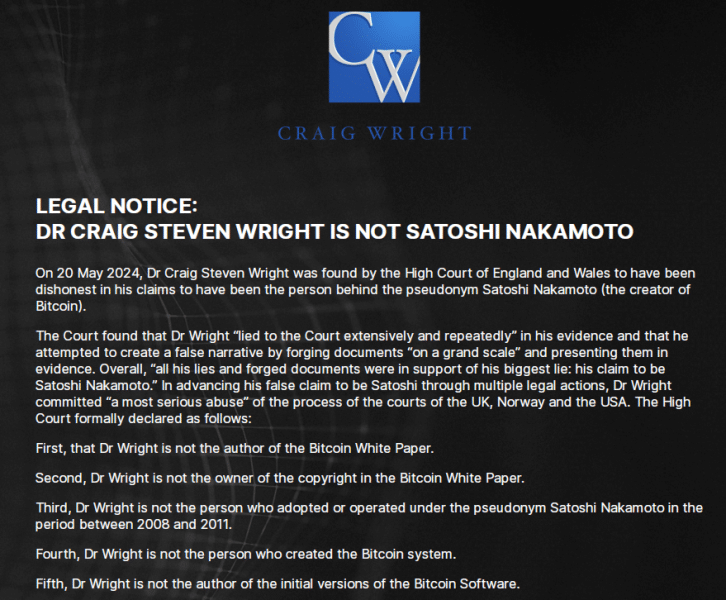The Australian computer scientist Craig Wright finally admitted this week that he was not the pseudonymous creator of the Bitcoin network – Satoshi Nakamoto – after the High Court of England and Wales ruled that he lied extensively about his role in the creation of the world’s first blockchain protocol.
Justice James Mellor delivered the damning verdict on May 20 after he found that Wright had made dishonest claims that he was the person behind the anonymous online users responsible for the creation of the network.
In Mellor’s words, the evidence confirming that Wright’s claims are false was “overwhelming”.
Also read: Satoshis in Bitcoin – BTC’s Denomination Explained
“Most of his lies related to the documents he had forged, which purported to support his claim… Dr Wright’s attempts to prove he was/is Satoshi Nakamoto represent a most serious abuse of this court’s process,” Mellor stressed.
The court ruled the following in regard to Wright’s case:
- Wright is not the author of the Bitcoin white paper.
- Wright was not the person behind the pseudonym Satoshi Nakamoto between 2008 and 2011.
- Wright is not the person who created the Bitcoin system.
- Wright is not the author of the initial versions of the Bitcoin software.
Justice Mellor also noted that Wright had forged documents “on a grand scale” to support his false claims. For those of us in the crypto community who realized he was a charlatan all along, this is a nice ending to this saga.
Wright Updated his Website Today to Incorporate the Court’s Ruling
Following the court’s decision, Justice Mellor ordered Wright to publicly acknowledge that he is not Satoshi Nakamoto. The order required Wright to post a legal notice on his website, his X (formerly Twitter) account, and in Slack channels where he communicates with his supporters.

The legal notice on Wright’s website now reads:
“On 20 May 2024, Dr Craig Steven Wright was found by the High Court of England and Wales to have been dishonest in his claims to have been the person behind the pseudonym Satoshi Nakamoto (the creator of Bitcoin).”
The notice goes on to detail the court’s findings and explicitly states that Wright is not the author of the Bitcoin white paper, the creator of the Bitcoin system, or the person who operated under the Satoshi Nakamoto pseudonym.
It Took COPA Three Years to Get Wright to Admit He Lied
The case against Wright was brought by the Crypto Open Patent Alliance (COPA), a non-profit consortium of crypto companies. COPA filed the lawsuit in April 2021 to prevent Wright from asserting copyright claims over the Bitcoin whitepaper and database.
Throughout the six-week trial, COPA presented evidence that Wright had fabricated his claims and repeatedly changed his story as inconsistencies were being brought up, identified, and challenged by the plaintiffs.
Some of the inconsistencies that were identified during the trial included Wright’s comments concerning the influence of the works of Wei Dai on the creation of the bitcoin blockchain.
COPA demonstrated through hard evidence that Nakamoto’s communications clearly showed that he became aware of Dai’s work after he wrote the Bitcoin whitepaper.
Moreover, Wright claimed that the term “cryptocurrency” is inaccurate and should not be used to describe the native asset that powers the Bitcoin blockchain. However, Nakamoto’s communications show that he, at some point, embraced the text.
Jonathan Hough, legal counsel for COPA, stated during his closing argument: “After all the evidence in this remarkable trial, it is clear beyond doubt that Craig Wright is not Satoshi Nakamoto. Wright has lied, and lied, and lied.”
For years, Wright has used his claim of being Bitcoin’s creator to initiate multiple lawsuits against developers and other parties he accused of violating his alleged intellectual property rights. The High Court ruling and Wright’s subsequent admission will probably lead to immediate dismissals in many of these cases.
Justice Mellor’s order explicitly prohibits Wright from initiating any further legal proceedings based on his false claims. This injunction extends to both direct actions and threats of such actions, effectively putting an end to Wright’s “litigation terror campaigns” as his actions were described by a COPA spokesperson.
Wright Now Faces Criminal Charges for His Actions
LEGAL NOTICE: DR CRAIG STEVEN WRIGHT IS NOT SATOSHI NAKAMOTO
On 20 May 2024, Dr Craig Steven Wright was found by the High Court of England and Wales to have been dishonest in his claims to have been the person behind the pseudonym Satoshi Nakamoto (the creator of Bitcoin).
The…
— Dr Craig S Wright (@Dr_CSWright) July 17, 2024
The High Court has instructed the Crown Prosecution Service (CPS) to consider filing charges against Wright for forgery of documents and perjury as his actions provided the basis for this referral.
If the CPS opts to pursue these charges, Wright could face severe legal consequences for his claims. It is also possible that Australia applies to extradite Wright so he can face legal proceedings in his home country.
Most of the crypto community was skeptical of Wright’s claims since the case began. Hence, those who have been arguing for years that he is not Nakamoto have voiced their relief that this matter has finally been settled.
One of the most notable critics of Wright’s claims was Jack Dorsey, the founder of Twitter and one of the top backers of the COPA alliance through his company Block. He, alongside other prominent players in the space like Coinbase, battled against Wright to keep the blockchain network from being privatized by a liar.
The Search for Satoshi Continues
Now that Wright has admitted that he is not Nakamoto, the mystery surrounding the true identity of the creator of the first blockchain remains unsolved. This has been the subject of speculation and fascination for crypto enthusiasts since the network became active in 2008.
At the time of writing, there are a handful of top candidates for the identity of Satoshi but it seems like we may never know for sure. One of the top contenders, Hal Finney, passed away over a decade ago while another popular choice, Adam Back, is still active helping to improve Bitcoin to this day.
It is worth noting that the outcome of Wright’s trial does not affect the operations of the Bitcoin network at all. The decentralized nature of the blockchain allows it to run independently and free from the influence of a single person or organization.
However, the resolution of this long-standing controversy may help the community to refocus its attention on the technology itself and its real-world applications rather than on the personal claims of individuals purporting to be its inventor.
